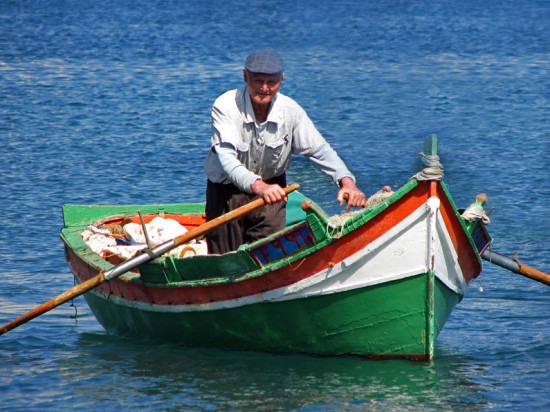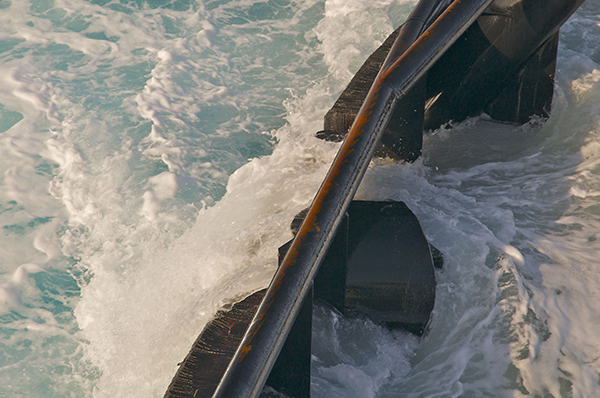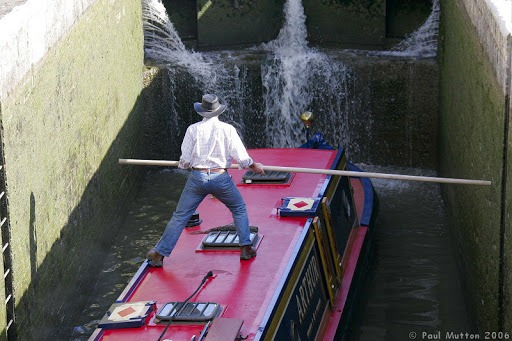Nautical idioms and sailing terms
From “Having both oars in the water” to “Dragging your anchor“, nautical idioms have enriched our language…
201. Having both oars in the water
Clearly, “boaty” speak by reference of the oars and meaning that you are calm and collected and moving forward with purpose. Conversely, the saying “not having both oars in the water” means the opposite evidenced by the fact that when you only have one oar in the water you will go in circles.
For example: “When Smithies took over the role of CEO he had both oars in the water and took the company to new heights…”

202. Lower Deck Lawyer
If someone calls you a “lower deck lawyer” then that someone thinks you are a “know-it-all” with a bit of knowledge just enough to be dangerous…
203. Scupper
Scupper originated as old seafarer’s slang for injured or killed. A scupper is literally an opening from which access seawater can drain from the deck back into the ocean. Being washed through a scupper was a bad thing and hence the slang meaning. The scupper is also now adopted in the building industry where it serves a similar purpose in channelling water from the roof through a hole in the facade of a building.
Today it is used to mean destroying something like a plan or idea. It is also used to denote sinking your own vessel. As in: “Smithies scuppered his boat to claim on the insurance…”

204. Cracking on - get cracking
We use the term “cracking on” or “get cracking” relatively often when we want to encourage someone to start or speed up procedures respectively.
Cracking on in maritime terms means simply to add more sails and the process of adjusting sheets. The cracking referred to the luffing of the sails until the sheets were hauled in enough to stop the “creaking”…
205. Maiden voyage
Literally, a “maiden voyage” is the first journey made by a ship or spacecraft.
As an idiom, we may broaden this to include anything new we are about to embark on.
For example: “Smithies admitted that it was his maiden voyage and not to expect too much of him as he entered a breakdancing competition for the very first time…”
206. Mayday (SOS)
“Mayday” is the globally recognised voice radio signal for ships and people in serious trouble at sea. The word comes from the French m’aidez which means “help me” and was first introduced at Croydon Airport in London by a radio officer named Frederick Mockford because SOS was not well understood over voice radio.
Where voice is not practicable, an S.O.S. Morse code will pretty much have the same meaning. However, against popular belief, the letters “SOS” have no literal meaning such as “Save Our Souls” or “Save Our Ship”.
The distress call ‘mayday’ may be used only if the boat is in imminent or serious danger and immediate assistance is required. For less serious matters, the call “PAM PAM” is used…
As an idiom, we may use “mayday” to denote some type of trouble we find ourselves in.
Distress frequencies:
- VHF 16, 27.88 MHz
- HF 4125, 6215, 8291 kHz.
Call procedure:
- “mayday, mayday, mayday”
- “this is – name and radio call sign of boat in distress” (spoken 3 times)
- “detail of boat’s position”
- “nature of distress and assistance required”
- “other information, including the number of people on board, vessel description and intentions”.
207. Scuttle
Scuttle, as opposed to “scuttlebutt” has a definitive meaning in the maritime business. In essence, it means the deliberated sinking of a ship. The verb scuttling, therefore, involves the creation of a hole in the ship’s hull situated under the waterline resulting in the flooding of the hull and subsequent sinking of the ship. Ships are often scuttled to create a dive destination as it creates a man-made reef attracting aquatic species. In history, there are also many examples where ships were scuttled to form a barrier or blockade to avoid enemy ships entering harbours.
In today’s language, you can use scuttle to explain the deliberate undermining of a plan or a proposal. For example: “Smithies erroneous navigational advice to the captain scuttled his chances of a promotion.
208. Dead marine
The idiom “dead marine” refers to an empty liquor bottle. It is synonymous with “dead one” or “dead soldier” which all mean pretty much the same thing.
For example: “It was disheartening to find all these dead marines on the floor even after I told you to clean up after your party”.
The origin is a bit vague but there is some evidence that the term was “marinized” by William IV, then still the Duke of Clarence, in the late 1700s where he ordered his servants to remove the “dead marines” to make way for the next round of drinks…
209. Flogging a dead horse
There is some credible evidence that “dead horse” refers to the payment of crew’s wages one month in advance to entice sailors to sign on for the next voyage. Ofter crew members would spend their one month’s advance on wild women and booze well before the ship sailed.
This led to a feeling that in the first month at sea the sailors paid off their earlier debt rather than earning wages and making money. Hence their work ethic during that first month at sea was less than enthusiastic if not a little resentful.
After the first month, a pennant was raised in the rigging depicting a dead horse in celebration of clearing their debt.
Today we simply use the idiom “flogging a dead horse” or “beating a dead horse” to say that whatever we are doing is a waste of time and will never have the desired outcome…
210. Dragging your anchor
Dragging your anchor is used today as an idiom to describe someone’s behaviour as sluggish or unenthusiastic or perhaps pointing out someone’s inefficient work methods.
In nautical terms, dragging your anchor means that you are potentially drifting towards danger as the anchor is failing to set…

211. Forging ahead
The naval term “forging ahead” means moving the vessel forward slowly.
Today we use the idiom to mean “press on” be it slowly or otherwise…
212. Lay of the land
The lay of the land was used to extrapolate the depth and makeup of the seabed before we had detailed charts, marks, or depth sounders. It was assumed that as a general rule that if the shore was rocky and steep then this would carry on under the waterline. Or, if the lay of the land was sandy and flat, one could assume the seabed was shallow and sandy.
Today we use “lay of the land” in a very similar manner in order to describe the shape and composition of the land. For example: “The angulating grassy hills of Wales stretched out for miles…”
213. Adorning
From the Latin “adornare” meaning to embellish.
Adorning was used in the early days of shipbuilding where ornate carvings were added to the vessel for purely aesthetic or religious/superstitious reasons.
Now mainly used as a synonym for making things more beautiful or attractive…

214. Trim
Originally used to manage weight distribution on a vessel including cargo and passengers. As a result of “trimming”, the correct balance made the ship sit level on the water so it could sail more effectively and safer.
Subsequently, the sails were “trimmed” to further support the vessel’s stability and performance.
In today’s language, “trim” can mean anything from being in good order to a well-shaped body…
215. I wouldn't touch it with a barge pole
Barge poles are very long wooden poles used to guide barges through narrow channels and locks as well as pushing barges along.
The first time the idiom was used was in 1893 in Lady Monkswell’s Diary:
It will be a long while before any political party touches Home Rule again with the end of a barge pole.
Today, this very widely used idiom simply means that you do not like something and like to stay well away from “it”.
For example, “Smithies, the head needs cleaning out. Sir, if it was up to me, I wouldn’t touch that job with a (ten-foot) barge pole”‘

Do you know any other idioms?
If you have any idioms, expressions or sayings that you think have their origin in sailing or maritime in general then let us know by commenting below. Let’s make this the most comprehensive “sailing did you know” list around…
If you feel there are mistakes in the above idioms then don’t hesitate to say…
Pingback: 200 Nautical Terms and Sailing Phrases That Have Enriched The English Language - Tall Tell Tales
Pingback: Nautical idioms and sailing terms Part 3 - Tall Tell Tales
Pingback: Nautical idioms and sailing terms Part 4 - Tall Tell Tales
I think “hard pressed” is also one, from captains having to “press” a port to find crew